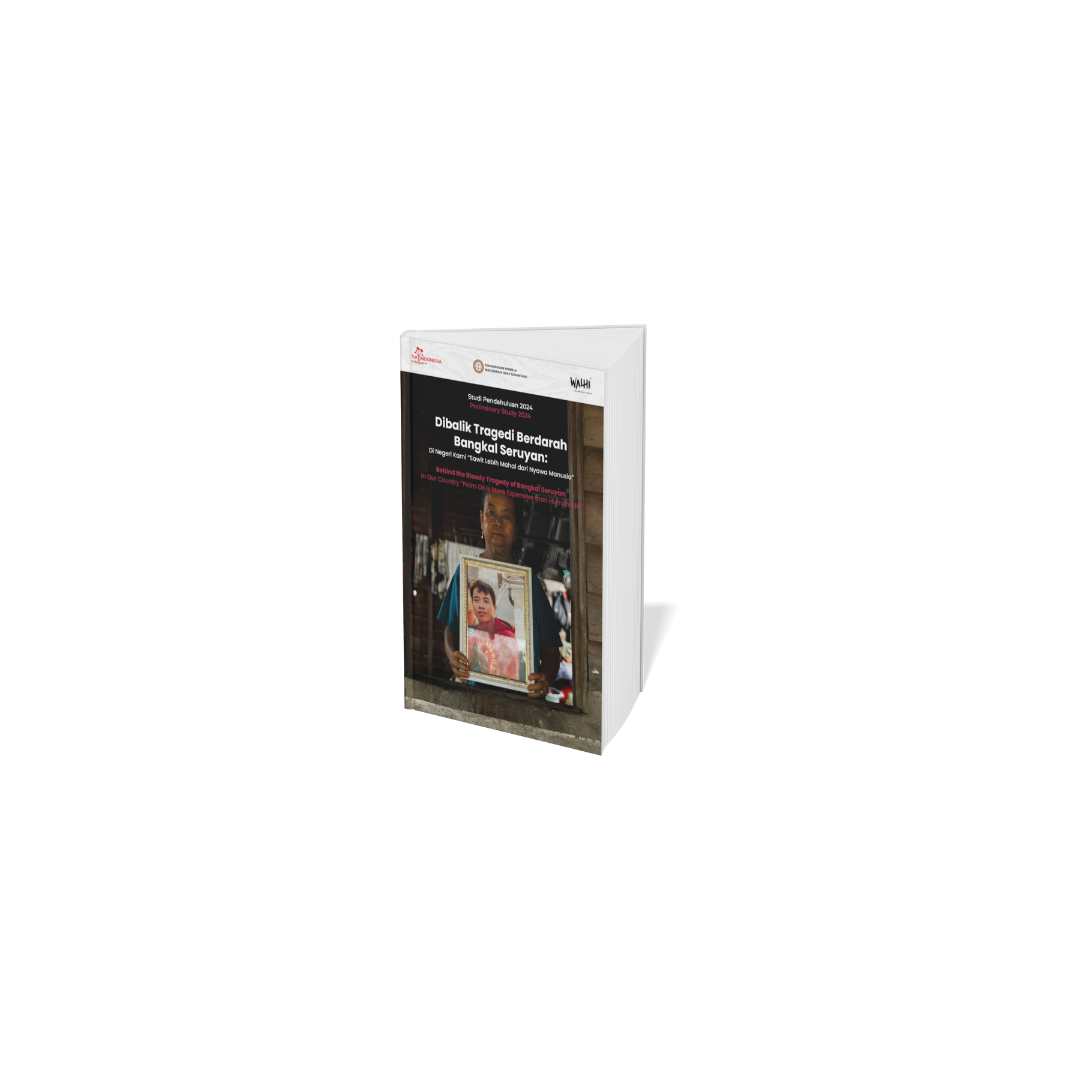1 November 2024 4 menit
Behind The Bloody Tragedy in Bangkal Seruyan: Here ‘Palm Oil Is Worth More Than Human Life’

Press Release
Jakarta, 31 Oktober 2024 — Today, Transformasi untuk Keadilan (TuK INDONESIA), the Indigenous Peoples Advocacy Association of the Archipelago (PPMAN), and WALHI Central Kalimantan released a research report titled “Behind the Bloody Tragedy of Bangkal Seruyan: In Our Land, ‘Palm Oil Is More Valuable Than Human Lives.’” This report sheds light on the dark side of agrarian conflicts driven by the expansion of the palm oil industry in Bangkal, Seruyan, Central Kalimantan. The report was also submitted to the National Commission on Human Rights (Komnas HAM) on October 30, 2024.
The research highlights several findings from the conflict between Bangkal villagers and PT Hamparan Masawit Bangun Persada (HMBP). First, there are human rights violations against Indigenous communities and environmental preservation, as stated in Komnas HAM’s recommendations dated April 16, 2024, which include cases of civilian shootings and the company’s failure to provide plasma plantations to local communities. Second, there is suspected involvement of law enforcement in a security-for-hire scheme that led to the shootings. Third, villagers’ rights to obtain plantations guaranteed by law were ignored. Fourth, Best Agro International is suspected of operating a shadow business, with no official information regarding its financial structure or supply chain.
Bayu Herinata, Director of WALHI Central Kalimantan, emphasized the negative impacts of irresponsible business practices on both the environment and local communities living near these operations. “We urge the government and relevant authorities to immediately follow up on these alleged violations and strengthen oversight of companies operating in environmentally critical areas,” said Bayu.
Bayu also highlighted PT HMBP’s alleged forestry violations, including administrative deficiencies in its permits and operations in protected forest areas. According to Ministry of Environment and Forestry Decree No. SK.196/MENLHK/SETJEN/KUM.1/3/2023, the company has been operating illegally on 4,769.52 hectares of land, including Production Forest and Convertible Production Forest areas. PT HMBP’s activities extend to the shores of Lake Sembuluh and riverbanks, where waste from plantations contributes to water pollution, degrading the quality of water relied on by local communities for clean water and livelihoods, such as fishing and aquaculture.
Bayu stressed the urgency of firm government action, particularly from local authorities, to evaluate PT HMBP’s operational permits. “We hope that the authorities will pay immediate attention to this issue and provide solutions to ensure justice and sustainability for the people and the environment in Central Kalimantan,” he said.
The coalition’s investigation also uncovered a 2020 directive from the Central Kalimantan Regional Police, which assigned security duties in PT HMBP’s operational areas, including payment requirements imposed on the company to fund law enforcement presence. Evidence also revealed the deployment of an excessive force of 440 personnel to suppress protests by villagers demanding their rights. This highlights the suspected securitization of law enforcement in service of corporate interests, sidelining basic human rights principles.
Surti Handayani, International Advocacy and Emergency Response Coordinator at PPMAN, explained that businesses and human rights rarely align to fully protect the rights of Indigenous Peoples, particularly in Bangkal-Seruyan and Indonesia as a whole. “The tragedy that resulted in Gijik’s death demonstrates that business operations take precedence over human lives, as evidenced by the suspected collusion between corporations and state institutions, particularly law enforcement,” Surti stated.
The massive expansion of palm oil in Central Kalimantan cannot be separated from the critical role of financial institutions in providing funding. According to TuK INDONESIA, palm oil tycoons operating in Central Kalimantan have received significant financing facilities, including from Bank Negara Indonesia (BNI). “Between 2016 and June 2024, total credit disbursed to palm oil tycoons reached USD 11.07 billion, or approximately IDR 157.8 trillion. One recipient is suspected to be Winarno Tjajadi, the controller of PT HMBP/Best Agro Group, who is also linked to BNI as an individual shareholder with growing equity,” explained Linda Rosalina, Executive Director of TuK INDONESIA.
Linda also highlighted BNI’s lack of public transparency. “When we requested information from BNI regarding these financing flows, TuK INDONESIA faced significant barriers to obtaining a transparent and accountable response. Our request for information was not processed in accordance with regulations and even disappeared from BNI’s system.”
Therefore, the Financial Services Authority (OJK) must enhance oversight, impose sanctions on banks that fail to meet sustainability standards, and ensure transparency and accountability in reporting the social and environmental impacts of their financing. “Transparency is crucial to preventing human rights violations and environmental damage indirectly supported by financial institutions, including banks,” Linda concluded.
The release of this report aims to increase public awareness and encourage stakeholders to pursue comprehensive reforms in the palm oil sector, including strengthening regulations, recognizing Indigenous Peoples’ rights, and implementing ethical and sustainable business practices.
Access the documentation and report via the following links:
Press Conference Documentation
Live Coverage
Research Report (Bahasa Indonesia)
For more information, please contact:
TuK INDONESIA: Icanna (08788 444 6640)
PPMAN: Surti (0853 3562 8126)
WALHI Kalteng: Bayu (0822 5511 5115)
This post is also available in: Indonesian
